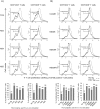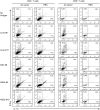Heterologous Immunity between Adenoviruses and Hepatitis C Virus: A New Paradigm in HCV Immunity and Vaccines
- PMID: 26751211
- PMCID: PMC4709057
- DOI: 10.1371/journal.pone.0146404
Heterologous Immunity between Adenoviruses and Hepatitis C Virus: A New Paradigm in HCV Immunity and Vaccines
Abstract
Adenoviruses (Ad) are commonly used as vectors for gene therapy and/or vaccine delivery. Recombinant Ad vectors are being tested as vaccines for many pathogens. We have made a surprising observation that peptides derived from various hepatitis C virus (HCV) antigens contain extensive regions of homology with multiple adenovirus proteins, and conclusively demonstrate that adenovirus vector can induce robust, heterologous cellular and humoral immune responses against multiple HCV antigens. Intriguingly, the induction of this cross-reactive immunity leads to significant reduction of viral loads in a recombinant vaccinia-HCV virus infected mouse model, supporting their role in antiviral immunity against HCV. Healthy human subjects with Ad-specific pre-existing immunity demonstrated cross-reactive cellular and humoral immune responses against multiple HCV antigens. These findings reveal the potential of a previously uncharacterized property of natural human adenovirus infection to dictate, modulate and/or alter the course of HCV infection upon exposure. This intrinsic property of adenovirus vectors to cross-prime HCV immunity can also be exploited to develop a prophylactic and/or therapeutic vaccine against HCV.
Conflict of interest statement
Figures








References
-
- McHutchison JG, Bacon BR. Chronic hepatitis C: an age wave of disease burden. Am J Manag Care. 2005;11(10 Suppl):S286–95; quiz S307-11. Epub 2005/10/20. . - PubMed
Publication types
MeSH terms
Substances
Grants and funding
LinkOut - more resources
Full Text Sources
Other Literature Sources
Medical

